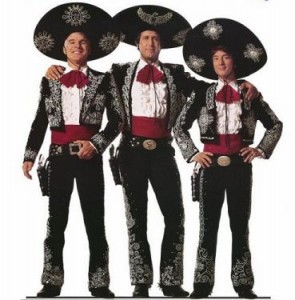 Welcome to the 60th edition of The Three Things, the weekly update of three links, podcasts, videos, or books you can’t miss – from Howie Goldfarb (Blue Star Strategic Marketing), Joe Cardillo (Visual.ly), and yours truly.
Welcome to the 60th edition of The Three Things, the weekly update of three links, podcasts, videos, or books you can’t miss – from Howie Goldfarb (Blue Star Strategic Marketing), Joe Cardillo (Visual.ly), and yours truly.
For those of you new to this series, The Three Things arrives in your inbox on Sunday mornings (unless you don’t subscribe, but that can easily be fixed if you hurry over and enter your email address or add to your RSS feed) so you have some extra time to spend perusing the obscure content we’ve curated for you (and one another) before your week begins and deadlines, meetings, and work takes over.
Today we explore the difference between the sexes, a storm brewing in the academic world, and happiness!
Howie on Finally Confirming – Men are from Earth, Women from Outer Space.
Oh yes, I knew it. You saw the header and thought, “Oh great he is going misogynist or sexist.” But seriously, being someone who knows Outer Space intimately, I am qualified to make this statement. Aliens tend to be the smartest life forms I know. Obviously the important male traits are becoming less important, and female traits more important for survival now that we aren’t savages anymore (well, most of us, anyhow).
As having directional sense, for example, used to be important, now we have Google GPS. Which women – because they multitask better than men do – can use while driving. Yet men spaz when using them? Have you seen my dad try to use his Garmin while in transit? I mean he has to pull over and plug in a location. The bottom line: The next time Gini Dietrich is told ‘Oh you are so smart!’ by a man, she can reply ‘I know, seems women are wired that way’.
How One Publisher is Stopping Academics From Sharing Their Research
Joe on How Open Access is Revealing Hypocrisy in Academic Publishing. There’s a storm brewing in the academic world. Much like other industries, academic publishing is late to the table in grappling with how to transition to the web and loosen the gatekeeping. If you read this article carefully you’ll notice that academic institutions/professors currently submit their work to closed/subscription access journals, then when approved, they have to pay those same journals for student access. Imagine if you were asked to do a ton of work and analysis, summarize your findings, and then when you wanted to share those findings with the world at large you had to pay for it? See any problems there?
My guess is that academic publishing will probably take a cue from social platforms, and start underwriting the process for sharing academic research, then monetizing that (albeit with lower profit margins, at least initially). But whether they do or not, the current model is probably unsustainable, since it’s antithetical to the web. Expect a massive fight, large academic publishing houses and university presses to fail, and lots of opportunity for academic institutions and startups that are willing to take risks.
Lindsay on Genetic Happiness. So, are you happy? What does that question even mean? One person’s happiness might be another’s descent into the bowels of H-E-Double-Hockey sticks! So why the great search – dare I say the *drive* – to understand happiness? It has been said that “happiness is as a butterfly which is always beyond our grasp, but…” if we would just chill out and relax for a bit, it would lightly land on our outstretched arm. Social scientists (apparently) have caught the butterfly. After 40 years of research, they attribute happiness to three major sources: Genes, events and values.
This is cool (I’m a bit of a geek for twin research). Researchers at the University of Minnesota have tracked identical twins who were separated as infants and raised by separate families. As genetic carbon copies brought up in different environments, these twins are a social scientist’s dream, helping us disentangle nature from nurture. These researchers found that we inherit a surprising proportion of our happiness at any given moment — around 48 percent. That’s an amazing figure – nearly half of our “happiness” being due to our genetic make-up. I’m not sure I completely buy it. But it’s an interesting discussion, either way.
Now it’s your turn. Is there a book, podcast, article, TV show, blog post, or story we should read?